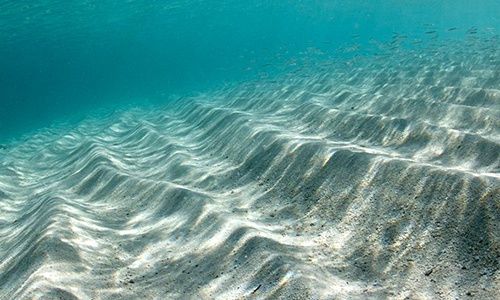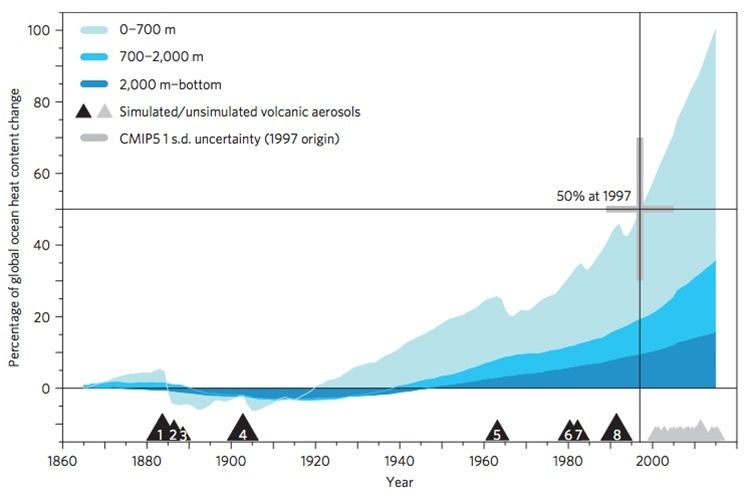

To address this, the study compares the different observational datasets with simulations from climate models (CMIP5) used in the latest Intergovernmental Panel on Climate Change, forced with historically realistic levels of greenhouse gases, emissions from land use, changes in solar activity and the temporary cooling effect of volcanic eruptions.
On the whole, the observations compared well with the average from the model simulations at all depths considered (0-700m, 700-2000m and below 2,000m). And it was passing this reliability test that allowed the scientists to cast the models backwards and examine how heat content in the oceans today compares to pre-industrial times.
Double Trouble
For the ocean as a whole, the authors find that 50 percent of the heat taken up since 1865 has occurred since 1997. In other words, the oceans have absorbed as much heat in the past 18 years as in the previous 130 years, the paper notes.
The study also find that while most of the heat stayed in the upper ocean, about 35 percent found its way to the deep ocean below 700m—and that fraction has increased steadily over time.
These new findings largely confirm what scientists already knew about human-induced climate change, says Dr. Matt Palmer from the Met Office Hadley Center:
“This research shows the strengthening of the climate change signal over time and that more of this signal is finding its way into the deep ocean.”
The study also confirms that while temperatures at Earth’s surface have risen more slowly over the past 10-15 years than in previous decades—a familiar feature if you look back at Earth’s full temperature record—there has been no such change of pace in the oceans. Palmer adds:
“[The study] confirms that ocean heat uptake has been proceeding at the expected rate—the ‘hiatus’ is a surface phenomenon. The Earth is still warming and the oceans have been taking up the bulk of that heat.”
The novel part of today’s study comes in the comparison of observations with climate models—particularly below 700m—and the comparison of ocean heat content now with preindustrial times. Scientists’ interest in studying the deep ocean has been driven partly by a wish to understand the behaviour of surface temperatures in recent times but mostly by advances in the ways available to monitor ocean temperature, says Palmer.
Bigger Picture
There is still some work to do in pinning down exactly how much heat the oceans have taken up in the past two decades and whether that can account for the whole so-called slowdown in surface warming, the paper notes. That’s not as straightforward as it sounds, largely because of how to account for the transition to ARGO floats from traditional methods, the paper notes.
Another point to note is that the climate models used do not include volcanic eruptions after 2000, which the authors estimate could offset the rise in global temperature by around 7 percent.
While the oceans seem to have slowed warming at the Earth’s surface in recent decades, this shouldn’t be interpreted as a good thing, says Prof. John Shepherd from the National Oceanography Center in Southampton. He says:
“Once the ocean heat uptake settles down again, the rate of warming is likely to return to what it was before.”
How the ocean acts to moderate surface temperatures is vital for understanding how our planet responds to greenhouse gases over the long term, a concept known as the “climate sensitivity.” The mechanisms and timescales at play are critical pieces of that ongoing puzzle.
YOU MIGHT ALSO LIKE
12 Experts Comment: What Oil Below $30 Means for Efforts to Tackle Climate Change
Real-Time Carbon Clock Shows Climate Change ‘Danger Zone’ Is Imminent
Scientists Link Extreme Weather to Climate Change
Stunning Images of One of Nature’s Most Incredible Phenomena

 233k
233k  41k
41k  Subscribe
Subscribe 
